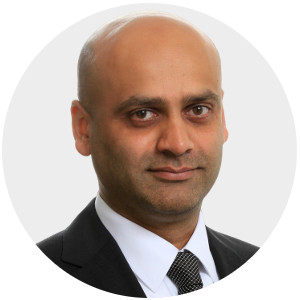Our sister publication ESG Clarity spoke to managers of responsibly invested funds to find out how they were positioned ahead of the coronavirus sell-off, the changes they made throughout the sharp movements and their outlooks for their portfolio holdings
It has been well documented that ESG holdings held up better than non-ESG peers during the market falls, with many pointing to the durability of franchises, sustainability of businesses in a downturn and ability to adapt and innovate in these markets as reasons why they have managed to outperform.
With this in mind, we asked fund managers across the ESG universe how they adjusted portfolios and, if higher-rated ESG stocks are potentially looking more fully valued than non-ESG stocks, how will they continue to generate superior returns?

Peter Michaelis, head of Liontrust’s sustainable investment team
Liontrust’s Peter Michaelis, head of the sustainable investment team, said healthcare stocks held up well in the group’s range of sustainable funds amid the wide market falls, while as millions of us face up to working remotely for the foreseeable future, several stocks under the team’s ‘connecting people’ and ‘enhancing digital security’ themes have also held up well.
During the volatility, Michaelis said the team asked themselves “have the prospects changed five and 10 years from now?”, and “how is the company positioned for the next six to 12 months in terms of cash and the capacity to flex down the cost base and access debt facilities?”
He said in the majority of cases, they remain confident in the long-term prospects of the companies they held.
“We are not the kind of investors who will pile into lower P/E stocks just because they are cheap, but we do expect to see opportunities to tilt within the portfolio. While our more defensive areas have outperformed on a relative basis, many of our technology names have struggled for example and we would potentially top up positions at these more attractive valuations.”
He also acknowledged that while higher ESG rated stocks held up better in the volatility than non-ESG peers, he doesn’t believe they look more expensive.
“I am not sitting here thinking every stock I want to own is overvalued. The Investment Association periodically says how much is in sustainable investment strategies and it is under 5% of the market. To liken it to the dot.com era when the vast majority of asset managers were piling into tech is wide off the mark.
“If you believe nothing will change in the world and the economy, and in 10 years’ time it is going to look exactly like the economy today, then you will come to a very different view and are going to think it is a great idea to buy stocks like BP, Shell and British American Tobacco.
“We have a very different view – we look around, we see the world is changing and we see it is changing rapidly.”
In terms of outlook, Michaelis said the team looks at the world through the prism of three mega trends – better resource efficiency (cleaner), Improved health (healthier) and greater safety and resilience (safer) – and has also identified 20 themes within these.
- Cleaner: Using our resources more efficiently (water, increasing recycling of waste, lower carbon energy sources and energy efficiency)
- Healthier: Improving our quality of life through better education, healthier lifestyles and diet or better healthcare
- Safer: Making the systems we rely on safer or more resilient. This includes car safety, keeping our online data safe with cyber-security and spreading risk through appropriate insurance mechanisms.
Looking ahead, Michaelis said: “Despite the huge toll this virus has already inflicted, we are beginning to see some light at the end of this dark tunnel. It is ultimately impossible to know what impact the current crisis will have on sustainable issues. On the one hand, we would hope the current ‘uniting against a common enemy’ trend could be directed against climate change in the future; on the other, we may find governments have used much of their firepower fighting economic slowdown to be spending money on sustainable projects for some time to come.”

Ketan Patel, co-manager of the Edentree Amity UK Fund and UK Equity Growth Fund
Ketan Patel, who runs the Amity UK fund and is editorial panellist for ESG Clarity, said amid the “flight to safety” where investors sought havens in more liquid large caps, healthcare, utilities, food retail and housebuilders supported the funds through the more trying markets.
“Online retailers such as Hotel Chocolat and Dunelm held up well, and so did early digitalisers that are also based on the High Street, such as Next. We still hold these positions and think they will continue to do well for the rest of this year.”
However, Patel was more pessimistic on the scope for an uplift in markets once lockdown is fully over…. And when that will be.
“I think we should ignore the idea that there will be a V-shaped recovery. There is a lot of speculation on how lockdown will impact GDP and jobs and when we will have a vaccine.
“I have covered healthcare as a sector analyst and I don’t believe we will see one in 2020, we will be lucky to see one in 2021. There is also the possibility of covid-20 this winter,” he said.
He added the level of unemployment is a “key figure” to watch in terms of economic damage, and although this appears to be limited in the UK (for now) it is soaring in the US.
“If we aren’t getting populations back to work by June/July, this will move deeper and deeper and be a 2021/22 issue. Our job is to pick stocks and ignore the macro but when the macro is so impactful and widespread as then we have to pay attention.”
He said defensive stocks will continue to outperform pointing to food and drink and power and gas but said, overall, he remains focused on quality.
“We want to own companies that are drilling down debt facilities, making sure they have cash flow and no capacity constraints coming through. It is important to know the management and communicate with them.
“We are looking for quality at a reasonable price – quality stocks will survive the weaker ones won’t,” he added.

Sarah Norris, investment director at Aberdeen Standard Investments (ASI)
The volatility was an opportunity for the team at ASI to assess positioning in the Global Ethical Equity Fund and Global Impact Fund, according to investment director Sarah Norris.
“We are constantly reviewing different risk analysis and want to make sure we are positioned in accordance with our forward-looking forecasts,” she said.
“There have been opportunities to add to names where the pressure in the market does not reflect the earnings potential.”
The team added some names to its Ethical strategy, one being Team Viewer, the remote web hosting site.
“The valuation had been high, we have seen strong earnings growth, so we took the opportunity to add this to the Ethical strategy.
“We also added Barry Callebaut, a sustainable chocolate producer. It was beaten up in the sell-off. It is a commodity (sugar and cocoa prices) driven name but has more defensive characteristics.”
In the Impact strategy, Norris said Kornit Digital, a sustainable printer for the textile industry, was added. Given the negative environmental impact conventional dying and printing has on the environment, the company’s waterless printing technology appealed to the team and as the valuation pulled back on the view covid-19 would lead to reduced demand, the company shifted to local production making it an attractive opportunity.
Norris added: “While short term there might be less demand from apparel manufacturers (given they are seeing lower demand from consumers) longer term there could benefit with the textile needing more local and on demand production which the digital printers provide.”
Commenting on the higher valuations ‘green assets’ may have following a better performance throughout the coronavirus sell-off, Norris highlighted there are still plenty of stocks to pick from.
“Some ‘green’ assets might have high valuations but there are also quite a few assets ‘turning green’ (i.e. going through a transition away from fossil fuels) with attractive valuations. Similarly, there are plenty of assets that have strong social sustainability characteristics (like distance learning or micro finance lending) that have seen valuations hit because of macro fears.”
She also added that rather than regulators delaying any green initiatives to cope with covid-19, ESG could be used as a way to boost the economy.
“It is possible the Green Deal could be implemented differently than we originally thought but it will likely still come through in some form, and indeed we’ve had as much commitment from the European Commission. How budgets are spent is a topic of debate but even as governments might prioritise stimulating the economy this could take the form of infrastructure spending which would align nicely with the Green New Deal,” she said.
For more insights on ESG investing, please click on www.esgclarity.com







